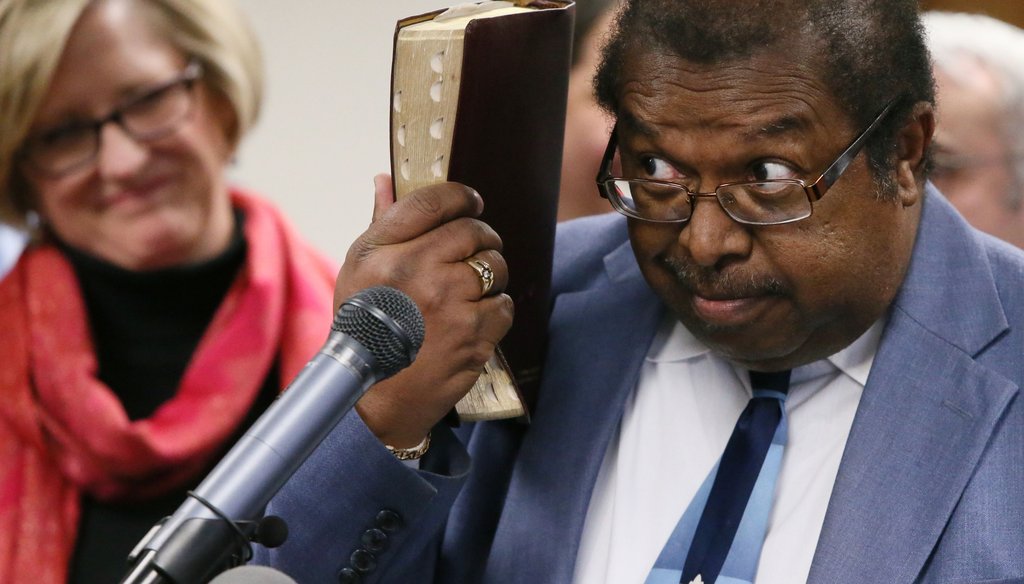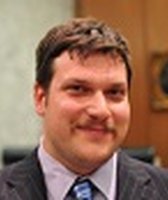Stand up for the facts!
Our only agenda is to publish the truth so you can be an informed participant in democracy.
We need your help.
I would like to contribute

The Rev. Timothy McDonald III of First Iconium Baptist Church holds his Bible as he explains his opposition to a religious liberty bill pending in the Georgia Legislature. Photo by Bob Andres / AJC.
A bill that supporters say would prevent Georgia’s governments from intruding on faith-based beliefs has cleared one chamber of the General Assembly.
But House Speaker David Ralston recently said that he is not convinced of the need of Senate Bill 129, indicating one of the fiercest debates at the Capitol this year is not yet over.
"I feel absolutely protected by the guarantees that our founding fathers put in the Constitution of this nation, the founders of Georgia put into the Georgia constitution," Ralston said on the GPB news show, "Lawmakers."
"My question is, and the question I’ve asked," Ralston continued, "If a Constitutional guarantee is not sufficient, then what is this bill, this statute going to do that our Constitution doesn’t do?"
PolitiFact Georgia wondered the same thing. As written, would the legislation known as a "religious liberty" bill offer any specific protection that is not already protected by the law of the land?
The answer falls outside a Truth-O-Meter ruling, since we cannot fact check a judicial interpretation.
But that doesn’t mean there are not judicial facts surrounding SB 129, which would require government to show a compelling interest for public policy to override an individual’s religious freedom.
That concept is called the Sherbert Test in legal circles.
For about two decades, it set the standard that governments must show they pursued action that was the least restrictive or burdensome to religion.
The U.S. Supreme Court limited that test in 1990, ruling in Oregon vs. Smith that individuals can’t claim religious exemptions from generally applicable laws that are not targeted directly at religion, said Eric Segall, the Kathy and Lawrence Ashe Professor of Law at Georgia State University and a Constitutional scholar.
Reaction to that ruling gave way to the Religious Freedom Restoration Act of 1993, in which Congress reinstated the Sherbert test.
"The federal Constitution does not allow people to escape their secular, general obligations on the basis of religious objections," Segal said. "If the rule were otherwise, the Constitution would enshrine religious supremacy not religious equality or liberty."
That’s something Ralston likely knows, since he is a practicing attorney.
But the federal religious liberty law is of little help, too. It applies only to federal actions, according to the Supreme Court’s 2014 ruling that allowed Hobby Lobby to opt out of some Obamacare mandates based on religious beliefs.
Statewide bills would extend those protections to state actions. Advocates of SB 129 have said that is there intent with the Georgia proposal.
Opponents warn the proposal is an end run on the First Amendment that could allow business owners to cite beliefs to deny people service.
Corporate players, in particular, helped kill similar bills last year, out of concern they would allow discrimination against gays and lesbians.
That is one of the issues still under intense debate under the Gold Dome.
Often missing from that back-and-forth: Georgia does not have any specific statewide protections for gays and lesbians.
Without that, SB 129 could in theory tilt the law in Georgia to allow religious exemptions to trump claims of discrimination, said Mark Goldfeder, an Emory Law School professor and senior fellow at the school’s Center for the Study of Law and Religion.
Goldfeder said Justice Oliver Wendell Holmes’ Bad Man theory – in which bad actors care only for the material consequences of law and do not follow their conscience – would suggest that priority could create problems.
"Georgia has not really had religion under attack," Goldfeder said. "The concern is that because of the gray area in Georgia's (anti-discrimination) law, a bill like this might allow people who were so inclined to discriminate, and simply assert that it is based on a religious belief."
That focus of the debate is likely to continue at least until April 2, when the legislative session is slated to end.
PolitiFact Georgia will keep watching, to see if either side makes claims based more on checkable facts instead of intent.
Ralston’s interview suggests those may be coming.
"I have said all along that I’m wrestling with the issue," he said in the GPB interview. "I think it’s an honest and civil disagreement over an intense and emotional issue."
Our Sources
Phone interview, Mark Goldfeder, Senior Lecturer, Emory Law School and Senior Fellow, Center for the Study of Law and Religion, March 16, 2015
Phone interview, Eric Segall, Kathy and Lawrence Ashe Professor of Law at Georgia State University, March 16, 2015
See also story links
















































